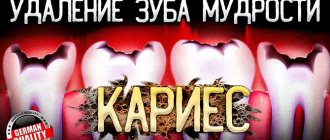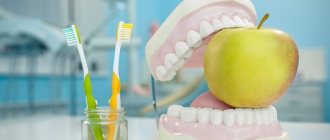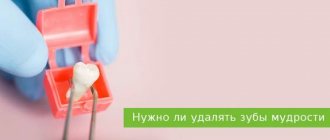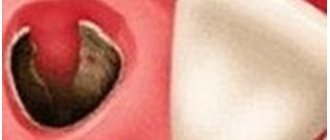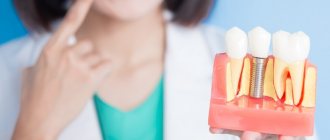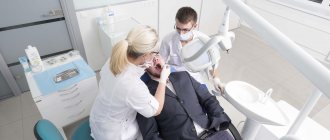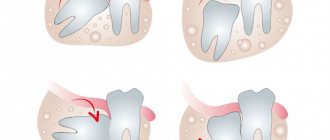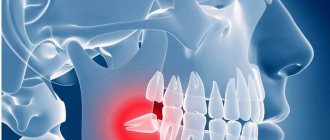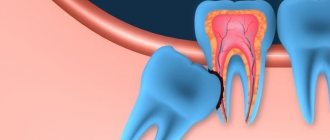In this material we will try to discuss how to prepare for wisdom tooth removal, basic recommendations, what is and is not possible before wisdom tooth removal, the postoperative period and possible consequences.
All this will help you prepare mentally and make it easier to endure the operation itself.
- When is it better to delete
- What you can do before tooth extraction
- What not to do before tooth extraction
- Recommendation before tooth extraction
- Recommendations after tooth extraction
- Postoperative period and possible consequences
Remember, you are the one who makes the decision to preserve or remove a tooth; if you don’t understand something, ask questions and don’t be shy with the doctors, because you are also responsible for the decision.
When is the best time to remove a wisdom tooth?
It is better to remove a wisdom tooth when it does not hurt!
Are you faced with the fact that the doctor recommended that you remove a wisdom tooth on the upper or lower jaw? Most likely there are certain indications for this.
Any surgical intervention during a period of acute inflammatory process occurs and is tolerated more difficult than during a period of relative rest. The healing period in such cases is more painful and longer.
Therefore, do not wait until the tooth hurts (IT WILL DEFINITELY HURT).
If you doubt or don’t trust a doctor, consult another one; if you have doubts, consult a third one.
Sedation and anesthesia - is it safe?
Yes, if they are carried out by professional doctors who have extensive experience and have undergone appropriate training (and a license is also required to perform general anesthesia - this requires an anesthesiologist-resuscitator), then the procedure will be completely safe. In addition, for complex and long-term implantation, the use of sedation is even preferable - you are less tired, you do not need to focus on keeping your mouth open for several hours and fixing your head in a certain position. For you, 3-4 hours of surgery passes in an instant. You will be under the supervision of specialists, and before the operation you will undergo a fairly extensive list of tests for high-quality preparation for treatment and selection of the most suitable, safe drug.
1 Zoryan E.V. Errors and complications when performing local anesthesia in dentistry, 2007.
Recommendations before wisdom tooth removal
It is better to remove wisdom teeth in the morning
The body is full of vital energy in the morning and easily experiences stress. Believe me, even just a visit to the dentist is stressful for some people. After the removal of the eighth teeth (wisdom teeth), pain may appear, which will go away after a few hours. If the operation takes place in the morning, then by the evening the pain will completely disappear and you will go to bed peacefully. In the morning, not only are you full of strength and energy, but so is your doctor. The doctor is not tired yet and is ready to devote maximum concentration of attention and time to the procedure. In case of any complications, you can easily go to the clinic, rather than looking for a 24-hour clinic with sleepy doctors at night or going to an ambulance.
Eat before wisdom tooth removal
(if you are not planning on sedation or general anesthesia) A well-fed person can tolerate stressful situations much easier. After eating, the body releases hormones that help you relax. Concentration decreases a little and you don’t really think about the procedures performed by the dental surgeon. More busy digesting food. A well-fed person's blood clots better than a hungry person's. This can greatly help to avoid unpleasant complications in the postoperative period.
It is strictly forbidden to drink alcohol before and after wisdom teeth removal
Alcohol can greatly change the rheological properties of the blood, which in turn can lead to significant swelling or prolonged bleeding with a risk to life. A person in a state of alcoholic intoxication is not attentive and cannot soberly assess the situation and make decisions. Plus, I’m not able to accurately remember the doctor’s recommendations; all this will lead to unpleasant complications.
What to take before wisdom tooth removal
Before the operation, the doctor will definitely inform you about all the medications that need to be taken before the operation. If you are very worried, you can use mild sedatives - valerian tincture, motherwort tincture, etc. Or the same drugs only in tablet form, for example Tenoten. If a long-term surgical intervention is planned, for example, removal of a retained or dystopic wisdom tooth, or tooth-preserving operations, or tooth implantation, it is reasonable to use non-steroidal anti-inflammatory drugs with a pronounced anti-inflammatory or analgesic effect, antibiotics, and antihistamines. It is better to entrust the choice to your treating dental surgeon about which drug to take.
A good mood is the key to successful treatment
Remember that a good positive attitude will shorten the recovery period and help you overcome surgical procedures more easily.
Anesthesia or pain relief
Local anesthesia is almost universally used in dentistry. All modern anesthetic drugs are non-toxic and hypoallergenic, provided they are selected correctly. Anesthetics used in private dental clinics are absolutely safe. Modern anesthetics can provide complete absence of sensation in the oral cavity for a long time, up to 5 hours. Thereby making the patient’s stay in dentistry comfortable. As an example, many patients fall asleep during dental appointments thanks to good anesthesia. “Anesthesia doesn’t take me away” - every dentist has heard this. The anesthetic affects all people the same. If the anesthesia has no effect (does not take effect) on you, then the doctor does not have the proper skills in administering anesthesia. It is not possible to become infected with infectious diseases during the administration of anesthesia. In private dental clinics, a special carpule syringe system is used, which completely eliminates contact of the solution and needle with the environment and even with the syringe itself. Anesthetics, if chosen correctly, do not affect the fetus during pregnancy and do not affect the composition of breast milk in nursing mothers. The quality of anesthesia can be affected by long-term use of non-steroidal anti-inflammatory drugs with a pronounced analgesic effect (painkillers), narcotics. Anesthetics are not addictive.
How to behave during the removal process
There are a lot of removal techniques and the choice of technique directly depends on the tooth and the situation in the oral cavity. In addition to the tooth extraction itself, the doctor must also ensure a comfortable stay during the process. Do not hesitate to talk about your unusual sensations, this may help the surgeon during the operation. Do not endure the pain, in modern dentistry there is a sufficient amount of anesthetics and, if necessary, the doctor will add anesthesia. During the removal process, you may feel pressure or crunching. The doctor will warn you about this in advance. The removal time depends on the qualifications of the surgeon and the initial situation, on average 15-30 minutes. The hole in the tooth was sewn up. Yes, this happens too. Based on our practice, almost any tooth extraction requires subsequent suturing of the hole, especially when it comes to further implantation in this area. Healing time is reduced and the postoperative period is easier to bear. If you or the doctor have any doubts about whether there is a piece of tooth left there, do not hesitate to ask the doctor a question or take a control X-ray. A gauze swab is not always placed as prescribed by a doctor.
Are there any disadvantages to local anesthesia?
Local anesthesia has virtually no disadvantages. Unlike drugs that were used previously, modern anesthetics are absolutely safe, have a minimum of contraindications, are quickly eliminated from the body, and do not have a negative effect on the heart, kidneys and liver. With professional administration, the patient will not feel any pain even during long surgical procedures.
“Our clinic uses a strictly individual approach. We have selected several of the most effective and safe drugs - for each patient we select our own method, drug and its concentration, based on individual characteristics. Therefore, everyone who undergoes treatment, implantation or prosthetics at the Smile-at-Once clinic can feel completely safe.”
Zhilenko Evgeniy Aleksandrovich, Implant surgeon, periodontist, orthopedist Work experience over 18 years make an appointment
Recommendations after wisdom tooth removal
- Behind the wheel. You should drive with caution if you have had a complex removal of a wisdom tooth, for example. Stress can lead to loss of alertness. It is not uncommon for patients to fall asleep while driving after a visit to the dentist.
- In case of a complex operation, if necessary, arrange for support in advance.
- Ask your dental surgeon for your mobile phone number and clinic number for emergency contact with your doctor. It is always faster to receive first-hand information if something bothers you after the operation or you simply have a question.
- Avoid smoking and drinking alcohol for the first days after tooth extraction. Both have a negative effect on healing. Smoking causes burns to the mucous membrane and disintegration of the blood clot
- Do not drink for about 2 hours after removal, until the blood clot fills the socket and attaches there.
- Do not eat until the anesthesia wears off. Otherwise, during the chewing process, you can damage healthy tissues that, under anesthesia, are not sensitive to injury.
- Eliminate coarse, spicy, salty, hot foods from the diet. This food negatively affects healing and can also cause discomfort at the site of tooth extraction and even pain.
- Avoid sports and heating the body (bath, sauna, solarium, hot shower) for 3 days. Sports and heat can cause bleeding from the socket of an extracted tooth and serious swelling of the head and neck.
- Gentle treatment of the surgical site. That is, exclude chewing on the side of the operation, do not climb into the hole of the extracted tooth with your tongue. In other words, create peace at the site of tooth extraction.
- It is forbidden to pick or clean the socket of an extracted tooth. Even if you see something unusual, contact your doctor. Self-indulgence can lead to complications that are very long and difficult to treat!
- It is strictly forbidden to rinse your mouth with anything after tooth extraction for 2-3 days.
- Self-medication, warming compresses, and so on are strictly prohibited.
- You can brush your teeth in the first days after tooth extraction; the only rule is to avoid the surgical area. Avoid strong rinsing movements in the mouth for 2-3 days.
- In case of any concerns, deterioration of health, or simply doubts arise. Do not hesitate and contact your doctor or clinic!!!
Remember! In 90% of all complications after tooth extraction, the cause is non-compliance with the doctor’s recommendations.
What is local anesthesia?
Local anesthesia allows you to numb the specific area where the intervention is planned. The patient is conscious. And this is actually more than enough even for complex surgical operations.
For local administration of all types of anesthetics, special reusable syringes are used, which have a recess for inserting a carpule - this is a hermetically sealed ampoule with an anesthetic. Unlike disposable ones, carpule syringes have a thinner needle, which allows you to administer the drug slowly and thus eliminate pain. All syringes for reusable use must undergo antiseptic treatment and sterilization using modern ultrasonic and temperature sterilization equipment.
How to rinse your mouth
Recommendations after molar tooth extraction always include a ban on rinsing on the first day after surgery - this procedure can remove a blood clot from the socket.
In the following days, rinsing with herbs - a decoction of oak bark, chamomile, calendula - will be useful to relieve inflammation and speed up the healing process. Among the medications you can use miramistin, furatsilin or chlorhexidine. A water-salt solution is also suitable.
The rinsing technique is simple: take the solution or decoction into your mouth, hold it for 20 minutes and carefully spit it out. No sudden movements.
You can cool it, but you can’t heat it up.
A cold compress will help reduce swelling and bleeding. But it should be used only on the recommendation of a doctor. Cold is applied through a thin cloth and held for no more than 25 minutes, otherwise hypothermia will occur, which can lead to unpleasant consequences.
Overheating can lead to inflammation or secondary bleeding. Therefore, for some time you need to forget about a hot bath, solarium.
